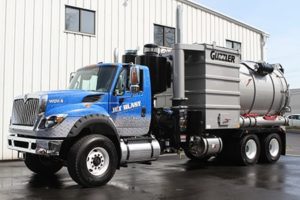
What is a vacuum truck and what can it do? Learn all about it here.
You might have seen them without knowing it: large trucks with giant hoses and pipes connected to them located at sewers or construction sites. Whether you have seen them live or not, vacuum trucks play a fundamental role in multiple industrial scenarios. Learn all about vacuum trucks and how they can support various industries. If you manage the cleaning of utilities, excavation projects, or emergency industrial messes, Jet Blast Inc. can come to the rescue in Maryland, Pennsylvania, Northern Virginia, Delaware, and Washington, D.C.!
What Are Vacuum Trucks?
These giant, humble trucks are not your average truck on the road. They might do the dirty work, but they do it unlike any other machine can. They work on the same principle as regular vacuum cleaners, creating a “vacuum,” a space without oxygen, between the suction and the object that the truck operator needs to remove. When this negative pressure occurs in that space, the sludge, dirt, ash, etc., will fill up that empty space.
Another way to think about it is how we drink through a straw. Sucking out the air in the straw creates an oxygen-deprived space that whatever is below the straw needs to occupy. However, instead of a strawberry milkshake, the vacuum truck is most likely consuming mud, ash, and other waste products.
Types of Vacuum Trucks
Hydro Vacuum Trucks
Hydrovac trucks, also known as liquid vacuum tankers, have the function of pressure-washing industrial-sized grime to soften or break them down, along with industrial vacuuming. They have one pipe with a hose and nozzle for breaking up debris and one pipe for vacuuming the broken-up bits. It is like how the dentist squirts water into a patient’s mouth with one tool and sucks up the loose remainder with another.
Dry Vacuum Trucks
Dry vacuum trucks only contain the vacuum part of the hydrovac truck, naturally, but they can suck up both wet and dry materials, despite the name. They use a pump to create the negative pressure and lift up the sludge, mud, concrete, fly ash, clinker, etc., into a tank with a filtration system. Any filtered water can return to the sewer system, while dry waste goes into proper disposal or to good use (e.g., fly ash becomes an ingredient in cement.)
Contact Jet Blast Inc. Today!
Jet Blast® Industrial Services strives every day in an effort to provide our customers with the best service and equipment possible. Providing a safe and stable workplace has allowed us to keep a team of quality people, with most having a tenure of 15 – 25 years with Jet Blast®. With all that experience under one roof, we have been able to provide reliable 24-hour service since 1979. I believe this helps to set us apart from the competition.
Compare us! Let us make your job easier. If you’re located in Maryland, Pennsylvania, Delaware, Northern Virginia, or Washington, D.C., contact us by email at [email protected], call us at 410-636-0730, or fax us at 410-789-3907, and don’t forget to keep in touch with us on Facebook!
